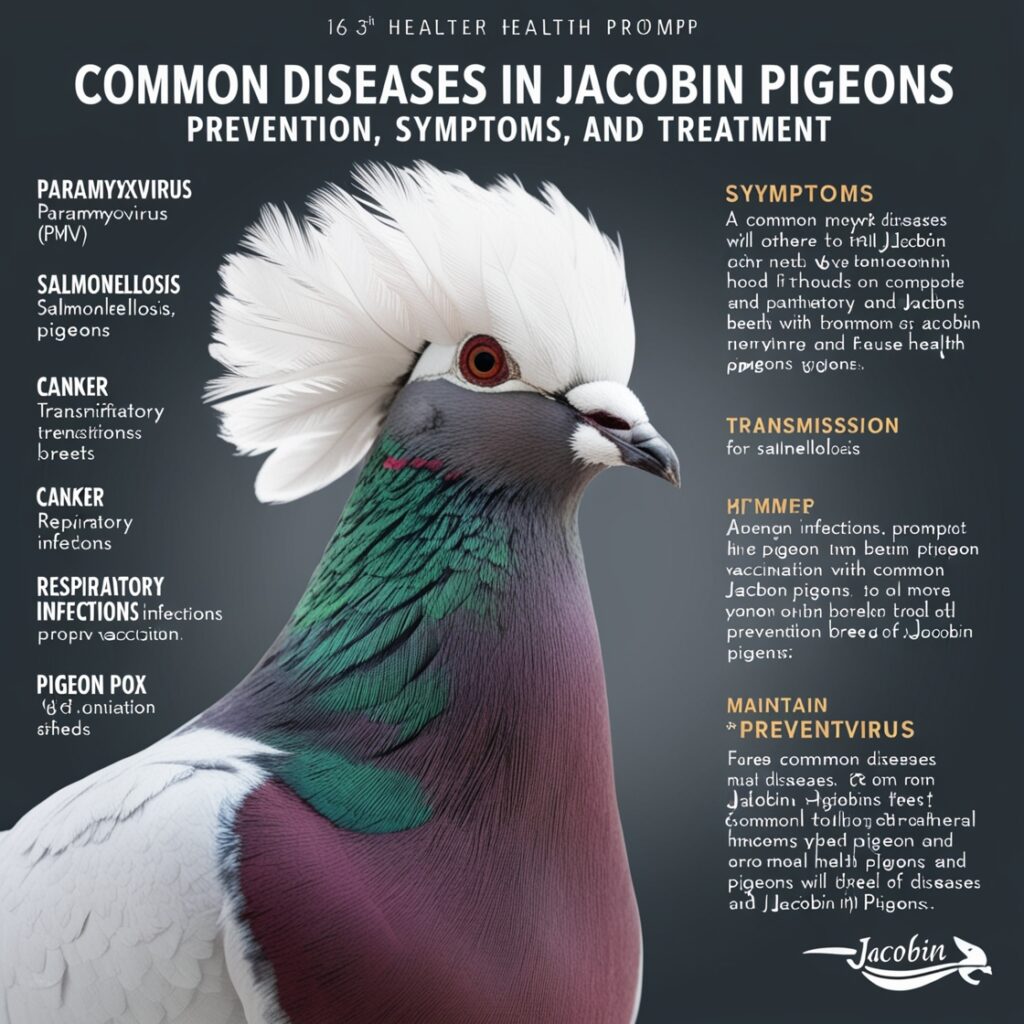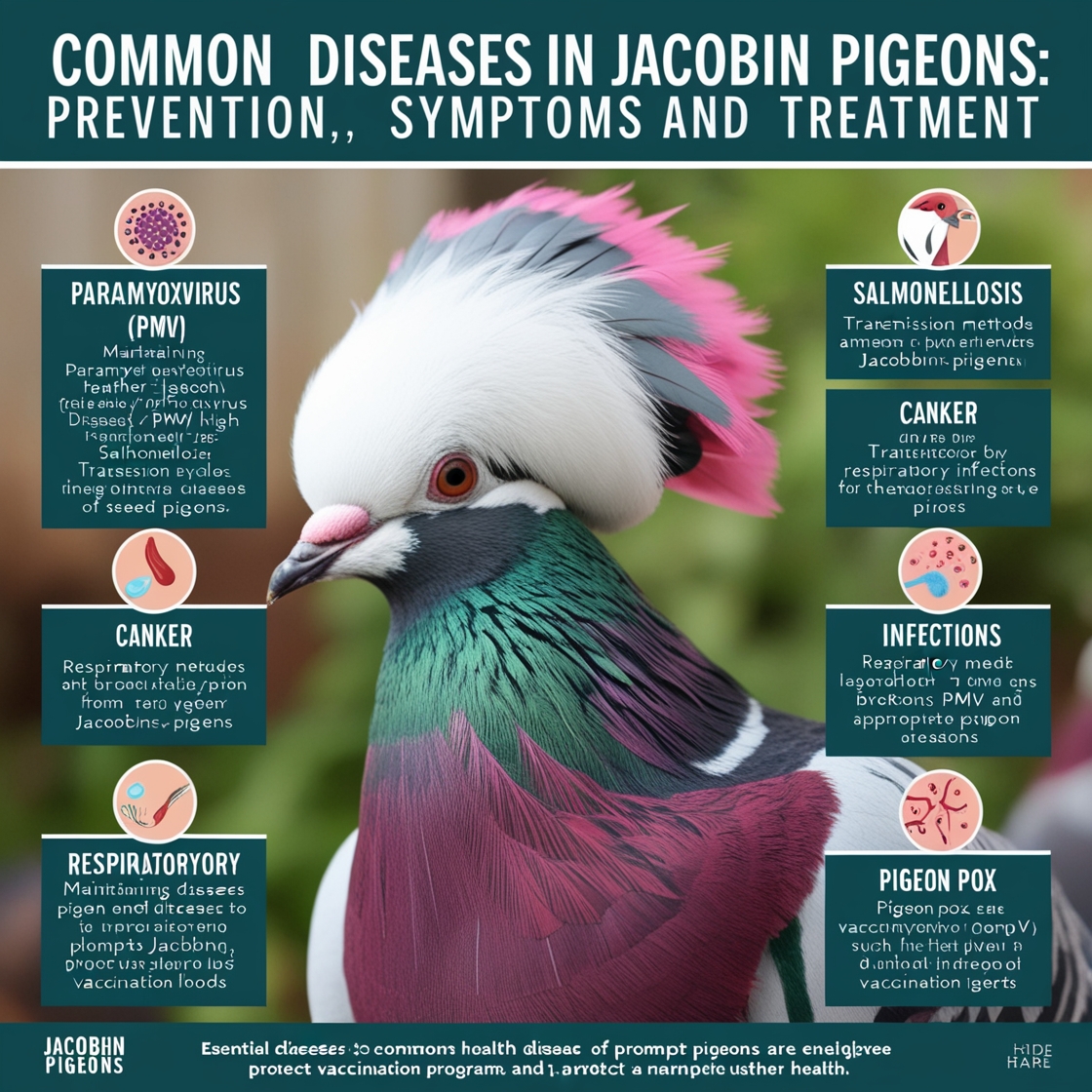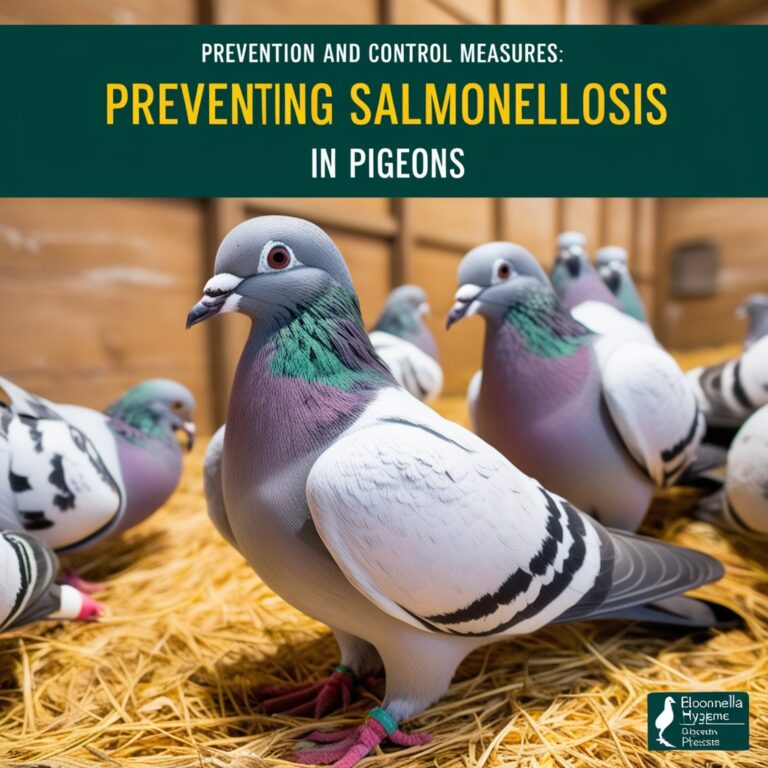Common Diseases in Jacobin Pigeons
Jacobins Pigeons: Common Diseases and Their Management
Common Diseases in Jacobin Pigeons
Jacobins are a unique breed of fancy pigeons, renowned for their distinctive feather hood that covers their head and neck. While their striking appearance makes them a favorite among pigeon enthusiasts, Jacobins are not immune to various health issues. Due to their specialized feather structure and selective breeding, they may encounter specific health challenges. This guide outlines common diseases affecting Jacobins, including their causes, symptoms, treatment, and prevention strategies.
1. Common Diseases in Jacobin Pigeons
1.1 Paramyxovirus (PMV)
Overview:
Paramyxovirus (PMV) is a highly contagious viral disease that poses a significant risk to pigeons, including Jacobins. If left untreated, PMV can be fatal.
Symptoms:
- Twisting of the neck (torticollis)
- Difficulty flying or walking due to nervous system impairment
- Diarrhea and increased thirst
- Lethargy and decreased activity
- Weight loss resulting from reduced appetite
Transmission:
PMV spreads through contact with infected pigeons, contaminated food and water, and droppings. Its rapid transmission in pigeon lofts makes prevention and early detection essential.
Treatment:
Currently, there is no specific cure for PMV. However, supportive care can aid recovery. Isolating affected pigeons and providing a calm environment, along with fluids and electrolytes to address dehydration, are vital steps.
Prevention:
Vaccination is the most effective strategy against PMV. Jacobins should be vaccinated annually to ensure protection. Additionally, maintaining proper hygiene in the loft, disinfecting equipment, and quarantining new arrivals are crucial to preventing outbreaks.
1.2 Salmonellosis (Paratyphoid)
Overview:
Salmonellosis, also known as paratyphoid, is a bacterial infection caused by Salmonella typhimurium that affects the digestive and nervous systems of pigeons. Jacobins are particularly susceptible due to their tendency to gather in groups and share resources, making the spread of infection more likely.
Symptoms:
- Diarrhea, often with a greenish color
- Lethargy and weakness
- Loss of appetite and weight loss
- Sudden death in severe cases
Transmission:
The bacteria can spread through contaminated food, water, and droppings. Close contact between birds increases the risk of infection.
Treatment:
Antibiotics prescribed by a veterinarian are effective in treating salmonellosis. Supportive care, including hydration and nutritional support, is also essential.
Prevention:
Maintaining good hygiene practices is key. Regularly clean and disinfect feeding areas, provide fresh water, and avoid overcrowding in the loft to minimize the risk of infection.

Overview of Salmonellosis in Jacobin Pigeons
Salmonellosis, commonly known as paratyphoid, is a bacterial infection caused by Salmonella typhimurium. This disease primarily affects the digestive and nervous systems of pigeons and poses a particular risk to Jacobins, who often congregate and share resources.
Symptoms
- Diarrhea: Characterized by foul-smelling, watery droppings.
- Swollen Joints: This may lead to lameness in affected birds.
- Decreased Fertility: Breeding birds may experience reduced fertility.
- Weight Loss: Pigeons may exhibit poor overall condition and significant weight loss.
- Nervous System Symptoms: These can include tremors and head tilting.
Transmission
Salmonella bacteria can spread through:
- Contaminated food and water.
- Droppings and direct contact with infected pigeons.
- Pests like flies, which can carry the bacteria, increasing the risk of transmission in lofts.
Treatment
Treatment for salmonellosis typically involves:
- Antibiotics: Prescribed by a veterinarian to combat the infection.
- Isolation: Affected pigeons should be isolated to control outbreaks.
- Cleaning: Thoroughly cleaning the environment is crucial to preventing further spread.
Prevention
To prevent salmonellosis in Jacobins, consider the following strategies:
- Maintain Clean Conditions: Regularly remove droppings to keep the living area hygienic.
- Provide Fresh Food and Water: Always ensure that pigeons have access to uncontaminated resources.
- Control Pests: Implement measures to control flies and rodents, which can carry the bacteria.
- Quarantine New Birds: New pigeons should be quarantined for at least 30 days before introducing them to the existing flock.
Canker (Trichomoniasis) in Jacobin Pigeons
Canker, also known as trichomoniasis, is a common parasitic disease in pigeons caused by the protozoan Trichomonas gallinae. Jacobins may be at a heightened risk for this disease due to their distinctive feather structure, which can trap moisture and bacteria around their heads.
Symptoms
- Yellowish, Cheesy Growths: These appear in the mouth, throat, and crop, making it difficult for the pigeon to eat and drink.
- Difficulty Swallowing or Breathing: Affected pigeons may struggle with ingestion or have trouble breathing due to swelling in the throat.
- Weight Loss and Regurgitation: Inability to consume food can lead to significant weight loss and the regurgitation of undigested material.
- Reduced Activity and Lethargy: Infected birds often display a lack of energy and decreased willingness to engage in normal activities.
Transmission
Canker spreads primarily through:
- Contaminated Drinking Water: Shared water sources can easily transmit the parasite.
- Direct Contact: Contact between pigeons can facilitate the spread, especially in situations where young birds are fed by their parents.
Treatment
Canker can be effectively treated with:
- Antiprotozoal Medications: Such as metronidazole or ronidazole. These should be administered under veterinary guidance to ensure proper dosing and efficacy.
- Prompt Treatment: Early intervention is crucial to prevent the disease from becoming severe or fatal.
By understanding these common diseases and implementing preventive measures, pigeon fanciers can help ensure the health and well-being of their Jacobins. Regular veterinary check-ups, proper hygiene, and attentive care are essential components of responsible pigeon keeping.

Canker (Trichomoniasis) Prevention in Jacobin Pigeons
To prevent canker in Jacobin pigeons, it’s essential to maintain good hygiene and take proactive measures:
- Fresh Water: Ensure that fresh water is always available, and clean water dispensers daily to prevent contamination.
- Clean Equipment: Regularly clean feeding and watering equipment to reduce the risk of spreading pathogens.
- Isolation and Veterinary Care: Isolate any pigeons showing signs of canker and seek veterinary advice promptly for diagnosis and treatment.
Respiratory Infections (Mycoplasmosis) in Jacobin Pigeons
Jacobins are particularly susceptible to respiratory infections, largely due to their unique hooded feathers, which can restrict airflow and trap moisture around their heads. This environment can foster the growth of bacteria and other pathogens, increasing the risk of respiratory issues.
Symptoms
- Nasal Discharge and Sneezing: Infected pigeons may exhibit a runny nose and frequent sneezing.
- Wheezing or Labored Breathing: Difficulty breathing may manifest as wheezing sounds or open-mouth breathing.
- Swollen Sinuses and Watery Eyes: Inflammation in the sinuses can lead to swelling, often accompanied by watery eyes.
- Reduced Appetite and Lethargy: Pigeons may show a lack of interest in food and exhibit decreased energy levels.
Transmission
Respiratory infections can spread through:
- Direct Contact: Contact with infected pigeons.
- Airborne Particles: Inhalation of pathogens from contaminated environments.
- Contaminated Surfaces: Pathogens can survive on surfaces, leading to transmission when healthy pigeons come into contact.
Overcrowding in lofts can exacerbate the spread of these infections.
Treatment
Treatment for respiratory infections typically involves:
- Antibiotics: Commonly prescribed antibiotics such as doxycycline or tylosin can help manage the infection.
- Well-Ventilated Environment: During treatment, providing a well-ventilated living space while keeping pigeons away from drafts is vital for recovery.
Prevention
To reduce the risk of respiratory infections in Jacobins, consider the following strategies:
- Ventilation: Ensure that lofts have adequate ventilation to minimize moisture and stale air, which can harbor pathogens.
- Avoid Overcrowding: Limiting the number of pigeons in a confined space can reduce the risk of disease transmission.
- Isolation: Sick pigeons should be isolated promptly to prevent the spread of infections to healthy birds.
By implementing these prevention strategies, pigeon keepers can help protect their Jacobins from respiratory infections and promote their overall health and well-being. Regular health checks, maintaining a clean environment, and ensuring proper ventilation are essential components of responsible pigeon care.

Pigeon Pox in Jacobin Pigeons
Pigeon pox is a viral disease affecting the skin and mucous membranes of pigeons, including Jacobins. The disease is usually transmitted through bites from infected mosquitoes or direct contact with infected birds. Due to their unique feather structure, Jacobins may be at an increased risk for skin infections associated with this disease.
Symptoms
- Skin Lesions: Wart-like growths develop on the skin, particularly around the beak, eyes, and feet.
- Respiratory Issues: In severe cases, lesions can form in the respiratory tract, leading to breathing difficulties.
- Reduced Appetite: Discomfort from the lesions can result in decreased food intake.
Transmission
Pigeon pox primarily spreads through:
- Vectors: Infected mosquitoes can transmit the virus.
- Direct Contact: Contact with the skin lesions of infected birds can also lead to transmission.
Treatment
There is no specific antiviral treatment for pigeon pox, but supportive care is essential:
- Comfort Care: Keep affected birds comfortable and monitor their condition closely.
- Veterinary Intervention: In severe cases, seek veterinary assistance to manage secondary infections.
Prevention
- Vaccination: Consider vaccinating against pigeon pox, especially in flocks where the disease has been previously observed.
- Mosquito Control: Implement strategies to reduce mosquito populations to lower the risk of infection.
- Hygiene Practices: Maintain good hygiene in the loft and isolate new birds for a period to prevent introducing the virus into the flock.
General Prevention and Management of Diseases in Jacobins
2.1 Biosecurity Measures
Effective biosecurity measures are vital for preventing disease outbreaks among Jacobins. Key strategies include:
- Quarantining New Birds: Always isolate new pigeons for at least 30 days before introducing them to the existing flock. This allows for monitoring any signs of illness and reduces disease transmission risks.
- Hygiene: Regular cleaning of the loft is crucial. Remove droppings and debris daily to limit harmful bacteria and parasites.
- Disinfect Equipment: Consistently disinfect feeding and watering equipment using bird-safe disinfectants to minimize pathogen spread.
2.2 Vaccination Programs
Vaccination is essential for protecting Jacobins from common diseases like paramyxovirus and pigeon pox. Collaborating with a veterinarian to establish a suitable vaccination schedule is critical for maintaining your flock’s health. Regular vaccinations can significantly reduce disease incidence and enhance overall flock well-being.
2.3 Nutritional Support
A well-balanced diet is fundamental for maintaining Jacobins’ health and strengthening their immune systems. Key aspects include:
- Quality Feed: Offer high-quality grains and seeds as the diet foundation. A varied diet helps meet their nutritional needs.
- Supplements: Provide essential vitamins and minerals to support health, particularly during stress or recovery from illness.
- Clean Water: Ensure access to fresh, clean water at all times, and regularly clean water dispensers to prevent contamination.
Conclusion
Jacobins, with their unique feather structure and charming personalities, require attentive care to safeguard against various diseases. By recognizing early signs of illness and implementing robust biosecurity measures, you can maintain a clean and healthy environment for your birds. Along with appropriate nutrition and a consistent vaccination schedule, these practices significantly contribute to the well-being of your prized Jacobins. Proactive prevention through vigilant monitoring, hygiene, and proper care is the most effective strategy to protect your flock from the myriad of diseases that may threaten their health.







